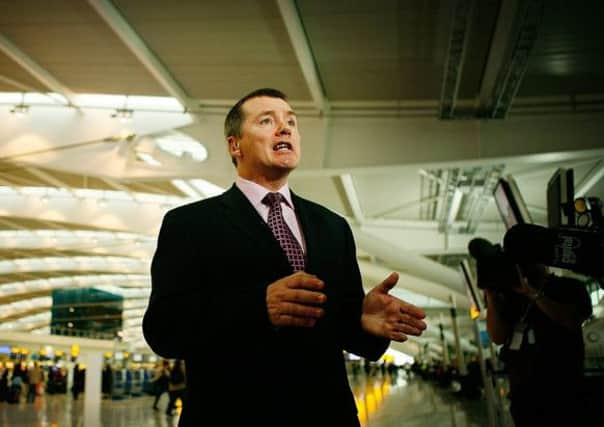Scottish independence boost from airline bosses


Bosses at British Airways and Ryanair said the SNP government’s plans to slash taxes on passengers would be good news for the industry and see more routes come to Scotland.
BA boss Willie Walsh and Ryanair chief executive Michael O’Leary spoke out as the country’s biggest airport warned current levels of air passenger duty (APD) were “holding Scotland back”.
Advertisement
Hide AdAdvertisement
Hide AdHowever, last night, Scottish Secretary Alistair Carmichael claimed other firms are set to express concerns about the prospect of an independent Scotland.
The airline chiefs’ remarks came a day after finance giant Standard Life warned it could move some operations south of the Border in the wake of a Yes vote.
The pensions and investments firm, which is based in Edinburgh, said it had concerns over a number of issues related to independence, including the currency and the tax regime.
Yesterday, BA’s owner IAG posted a profit of £433 million in 2013, compared with a major loss the year before. BA employs about 1,300 people in Scotland, including aircraft engineers and cabin crew.
After the profits were announced, Mr Walsh was asked whether BA was also making contingency plans for independence. He answered: “No, because we’ll continue to fly to Scotland.
“If anything, it might be marginally positive because I suspect the Scottish Government will abolish air passenger duty, because they recognise the huge impact that that tax has on their economy.
“So no, it’s probably going to be a positive development, if it does happen, for British Airways.”
Mr Walsh has previously indicated his support for independence over this issue and criticised the UK government’s approach to tourism and attracting foreign investment as “quite negative”.
Advertisement
Hide AdAdvertisement
Hide AdAPD ranges from £13 a person for short-haul economy flights to £388 for long-haul premium tickets. The tax is reserved to Westminster.
Mr Walsh’s comments were backed by Mr O’Leary.
The Irish businessman said he supported the position of the Scottish Government in relation to the abolition of APD, which he said “has done untold damage to Scottish tourism and particularly to traffic on domestic routes to and from Scotland”.
He added: “It’s not a narrow or small issue. Traffic in Scotland has declined in the past five years since travel tax has been imposed.”
Mr O’Leary said the tax, which the Scottish Government estimates would cost Scotland more than £200m a year in lost tourism expenditure, had a “penal” effect on business.
He said he refused get involved in the Scottish independence debate.
The Ryanair boss added: “Speaking as an Irishman, that’s a matter for the Scottish people. But certainly, if the air travel tax were repealed by the UK government, or an independent Scottish government, you’d see visitors to Scotland double over a five to ten-year period.”
Tourism is a cornerstone of Scotland’s economy and worth about £11 billion a year.
A spokesman for Edinburgh airport last night said the passenger duty was adversely affecting business. He added: “We think it’s something that holds back Scotland.
Advertisement
Hide AdAdvertisement
Hide Ad“We’re competing across Europe and the world for routes. We’ve got new routes to Chicago, Doha and Philadelphia, but we believe we could be getting far more. We’ve got the biggest tax in Europe, so when we’re going to compete against Copenhagen or Marseille or Helsinki, we start on a short-haul £13 per passenger behind them. Any easing of that can only help Scotland get more routes.”
The Scottish Government’s white paper on independence outlines plans to reduce APD by 50 per cent to boost international flight connections. The SNP says this reduction will be “with a view to abolishing it”.
The Scottish transport minister, Keith Brown, yesterday said: “This will make Scotland’s airports more competitive, cutting holiday costs and increasing tourism.
“Mr Walsh’s comments further underline the UK government’s duty to engage properly with the issues of the independence debate.”
But Mr Carmichael said more firms were set to voice concerns over a UK split as the financial reporting season gets under way.
He said: “Businesses are duty bound by the Companies Act to consider and disclose the risks of independence as they see them.
“This is now happening and companies are drawing up plans to deal with the risks that independence presents to their business and their customers.”